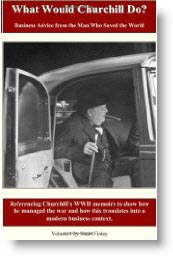Stuart Finlay sent me a copy of his book, "What Would Churchill Do? Business Advice from the Man Who Saved the World" a couple of weeks ago, and I just carved out the time to read it. The book focuses on Churchill and how we managed things during the heat of World War II -- the period of the Greatest Tests for the Greatest Generation.
 In this book, Finlay takes examples of Churchill's leadership and applies their principles to daily management and leadership. He does so with great effect, and the result is a very useful book on business improvement. There are 17 chapters, each focusing on a different lesson (and the reading is easy - these bite-sized morsels are each about 6-10 pages long).
In this book, Finlay takes examples of Churchill's leadership and applies their principles to daily management and leadership. He does so with great effect, and the result is a very useful book on business improvement. There are 17 chapters, each focusing on a different lesson (and the reading is easy - these bite-sized morsels are each about 6-10 pages long).
Patterns for success
As I sometimes point out here on the blog, I'm naturally a "pattern seeker" and I look for models in one area of my life that I can apply in other areas. This book feel like a perfect fit for me since, throughout the book, Finlay identifies patterns of action, strategy, and philosophy from Churchill's life and discusses how we can apply those notions in the context of our everyday lives.
But it's more than just a "here's a lesson - learn it and do it" kind of book. I found that Finlay's portrayal of Churchill's unconventional solutions to difficult problems, and the way he was open to hearing and accepting the ideas of others was very inspiring.
For example, one chapter called "Stay Passionate for Things you Don't Agree With," deals with examples of something I've heard referred to as "disagree and commit" in which you support ideas that you don't agree with in order to support the greater good - this can sometimess be difficult due to ego, but Finlay's examples illustrate the importance of being willing to do this.
I think my favorite chapters are:
- "Dealing with the Stalin's of This World," which discusses how to successfully deal with the difficult customers (literally and figuratively) we all encounter all the time, and
- "Entities Can't Show Loyalty," which illustrates why you can't get a team engaged without engaging the individuals on the team - groups don't embrace a cause or mission, people do.
And there are more where those came from. And, speaking of more, Finlay refers to this book as "Volume 1," implying that there are more coming. I hope so - I want to learn more from Churchill.
Related items:
